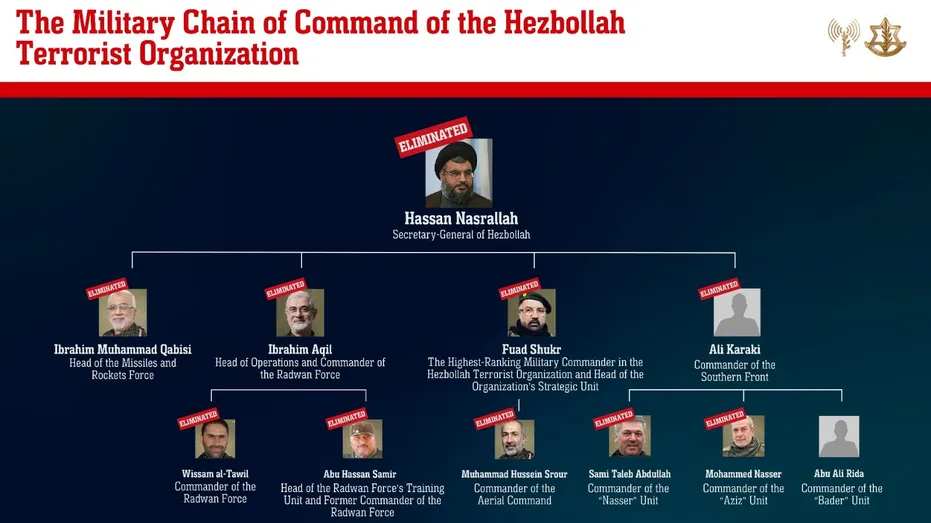Both Hezbollah and Israel’s military have confirmed the death of Hezbollah leader Hassan Nasrallah in airstrikes on their underground compound.
The Iran-backed group, labeled a “global terrorist” organization by Western nations, faced strikes in the Hezbollah stronghold of the Lebanese capital, and earlier reports had circulated regarding Nasrallah’s potential death.
Hezbollah officially acknowledged his death on Saturday, reports the New York Times, marking a significant setback for the organization following months of attacks on Israel in which it launched more than 11,500 missiles and rockets. One of those strikes hit an Arab soccer field in northern Israel, killing 12 Arab-Israeli children.

An IDF information chart showing how it decimated the Hezbollah chain of command in recent strikes. (IDF Spokesman’s Unit)
The Israeli Defense Forces (IDF) announced on Twitter that Nasrallah, along with Ali Karki, the Commander of Hezbollah’s Southern Front, and additional commanders, were taken out in the targeted airstrike on their headquarters located in Dahiyeh. Videos by Lebanese citizens showed multiple explosions after the initial strikes, indicating the compound also contained missile launch pads and a store of highly explosive materials.
READ: Ministry helps Lebanese Christians persecuted by Hezbollah
“This is not the end of our toolbox. The message is simple, anyone who threatens the citizens of Israel – We will know how to reach them,” the IDF’s Chief of the General Staff, Ltf. Herzi Halevi said of the elimination of Nasrallah.
Since 1992, Nasrallah has been at the helm of Hezbollah, guiding the organization as it evolved into a formidable military entity, bolstered by substantial support from Syria and Iran, especially from its Revolutionary Guards. The operation against Nasrallah appears to have been meticulously orchestrated, as IDF Chief Herzi Halevi suggested that additional actions could be anticipated against entities posing a threat to Israel.
The recent developments come in the wake of Hezbollah’s assault on northern Israel which have surged in intensity following Hamas’ invasion of Israel on October 7.
Iran, considered the world’s largest supporter of state-sponsored terrorism, says it will respond to Nasrallah’s death. Analysts suggest that Tehran could either choose to escalate tensions or exercise caution as it awaits global initiatives aimed at reducing the conflict.
Following this strike, the potential reactions from Iran are unclear, yet its choices are limited by logistical and strategic hurdles. The death of Nasrallah represents a pivotal development in the continuing conflict involving Israel, Hezbollah, and their associated regional partners like Hamas.
Israel this week pointed out that the UN has not enforced its vote that created a demilitarization of southern Lebanon and has, instead, allowed Hezbollah to operate without consequences in the region.
–Dwight Widaman and news services








